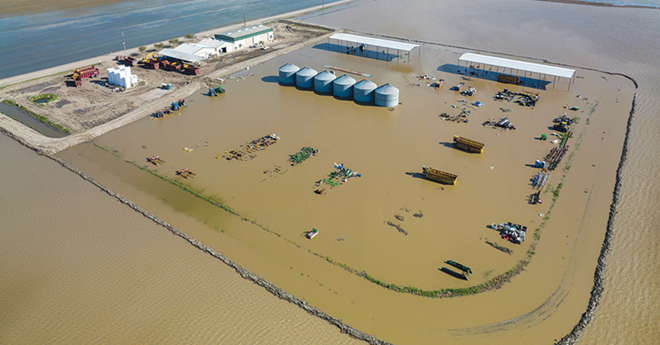

Jan 22, 20242023: The year in review
To specialty crop growers, and farmers in general, 2023’s big news in the industry wasn’t totally unforeseen: lack of labor is still an issue, severe weather damaged crops and technology continues to advance automation in fields and orchards.
September ended without a new farm bill, followed by drama in the U.S. House that led to the ouster of Speaker Kevin McCarthy in early October. It wasn’t until mid-November when an extension was offered and approved.
Weather: A wet California, damage in Florida
Hurricanes and tropical storms damaged specialty crops on both coasts, along with other events — bomb cyclones and atmospheric rivers — that are becoming part of farmers’ vocabularies as climate change is increasingly cited as a cause of extreme weather events.
California growers faced significant flooding in the Central Coastal region, along with other areas, with multiple atmospheric rivers dumping rain over several months in winter and spring. A silver lining, perhaps, was the rain cancelling the immediate effects of widespread drought in many areas, with the promise of continued water from massive snowpack in some areas.
Tropical storm Hillary, originally a hurricane, followed in August, the first tropical storm to hit Southern California in 84 years. Although vegetable crops were also lost, the table grape and almond industries logged $930 million losses in Kern County alone.
In late August, Hurricane Idalia made landfall in Florida, damaging numerous specialty crops, with initial estimates of more than $60 million in damage to vegetable crops in Florida and destroying tens of thousands of pecan trees in Georgia.
Technology: Coming to an event near you
California again was the site for the FIRA USA show, which had its second annual event in Salinas in September. The AgTech show participants debated how companies can work with fruit and vegetable growers to meet their needs, not what manufacturers think growers want.


Although California remains the hotbed of AgTech automation, robotics and autonomous technology are spreading eastward through trade events such as the Great Lakes Fruit, Vegetable and Farm Market EXPO in early December in Grand Rapids, Michigan.
Labor: Proposed H-2A changes panned
The year started with higher H-2A wages, known as the Adverse Effect Wage Rate (AEWR), with some states seeing double-digit hikes. In February, the federal government proposed higher fees, such as a $460 to $1,080 hike for petition fees and $600 for an asylum program fee.
Mid-November marked the end of a public comment period for the industry on another proposal to add worker protections and allow labor groups access to work sites and employee housing, which is provided by the hiring companies.
The National Council of Agricultural Employers (NCAE) called the proposal’s language “stunning in its arrogance and disconnectedness from the reality of the DOL’s own evidence,” according to an NCAE release.
In July, a new immigration law went into effect in Florida. Implemented by SB 1718, new regulations enacted a host of measures designed to deter undocumented immigrants from working in the state.
Agricultural interests warned of the consequences, and although it’s too early to document the overall effects on specialty crops, growers and other ag employers have said it’s definitely made finding labor in Florida even more difficult.
Congress pushes Farm Bill to 2024
The 2018 Farm Bill, set to expire with the fiscal year at the end of September (some programs expire at the end of the year), has been extended through September 2024. New House Speaker Mike Johnson’s continuing budget resolution, a stopgap measure to avert a government shutdown, included a year extension on the Farm Bill, and was approved by Congress in mid-November.
Congress will soon have to act again to avoid a government shutdown; Johnson’s “laddered” plan funds the USDA and departments of transportation, veteran’s affairs and housing and urban development. Funding for the Department of Defense and other agencies expire on Feb. 2.
In memoriam
The specialty crop industry lost some notable leaders in 2023.
Jerry “Dan” Swafford, 71, a Virginia Cooperative Extension specialist who championed the use of drones to gather data on crops, died Jan. 4. Swafford, Extension project associate and curriculum specialist, died at his home in Christiansburg, Virginia.
Craig Fox, 62, executive vice president at Fox Packaging, McAllen, Texas, died Feb. 1. He served the produce industry for more than four decades in his family’s business.
Peter Goulet, 64, a past chair of the Produce Marketing Association, a predecessor of the International Fresh Produce Association, died March 24. He previously was the owner of Pinnacle Sales & Marketing and director of produce merchandising at Hannaford Bros. Co.
Bernadine Strik, 60, a leading U.S. berry authority, died on April 14 in Corvallis, Oregon. Strik was a veteran Oregon State University professor of horticulture and Extension berry crop specialist and researcher.
Robert “Bob” Shinn Jr., 85, a former commissioner of the New Jersey Department of Environmental Protection who is credited with contributing to the preservation of New Jersey farmland, died May 5.
Kurt Dramm, 85, a leader in the horticultural supply industry, died May 16. Dramm co-founded Manitowoc, Wisconsin-based Dramm Corp., which supplies water treatment products and horticultural equipment for the commercial greenhouse and retail gardening sectors.
Peter Koppert, 73, a pioneer in biological crop protection and natural pollination, died June 20. He founded Koppert Biological Systems BV in the Netherlands, and remained involved as a member of the company’s advisory board.
Pam Durrence Dasher, 79, a third-generation Vidalia sweet onion grower and co-owner of G&R Farms in southeast Georgia, died July 24.
Michael Joseph Larose, 40, of BioSafe Systems LLC, died Sept. 21. He was the eldest of the third generation of BioSafe’s founding family.














